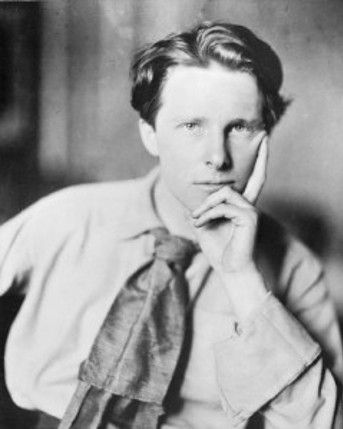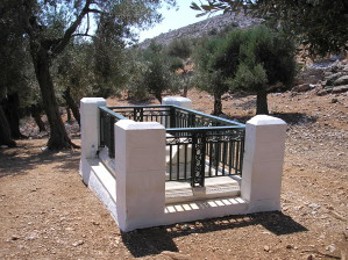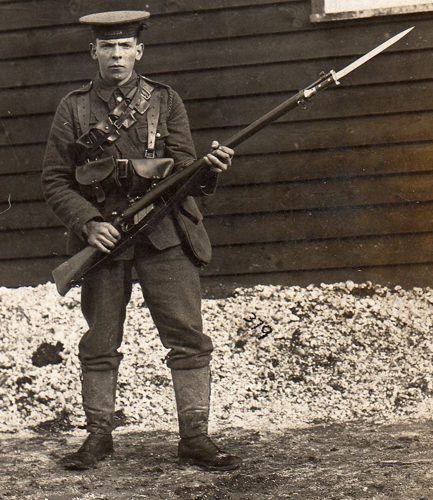Poetry of Gallipoli
This section looks at some of the poets who wrote about Gallipoli, both during the war and more recently.
Poetry written at the time
Rupert Brooke
Two days before the landings, one of the most famous First World War poets – Rupert Brooke – died from an infection, probably after an insect bite. He was with the Royal Naval Division at the island of Skyros, on his way to Gallipoli.


Rupert Brooke’s grave on the Greek Island of Skyros (Wikipedia)
This is Brooke’s most famous poem
If I should die, think only this of me:
That there’s some corner of a foreign field
That is for ever England. There shall be
In that rich earth a richer dust concealed;
A dust whom England bore, shaped, made aware,
Gave, once, her flowers to love, her ways to roam,
A body of England’s, breathing English air,
Washed by the rivers, blest by suns of home.
And think, this heart, all evil shed away,
A pulse in the eternal mind, no less
Gives somewhere back the thoughts by England given;
Her sights and sounds; dreams happy as her day;
And laughter, learnt of friends; and gentleness,
In hearts at peace, under an English heaven.
Brooke was writing about his love for England, but was also very aware of the Ancient Greek history of the Gallipoli area, and especially Homer’s ‘Iliad’. Other poets – and many of the officers – saw themselves as Classical heroes, following in the footsteps of Achilles, Agamemnon and Hector. The Great War at Sea Poetry Project has a page on Gallipoli.
Click on the images below for more poetry linked to Gallipoli (PDFs open in new windows).
Poetry written more recently
Geoff Page
Geoff Page is an Australian poet. His poem ‘Christ at Gallipoli’ pokes fun at the idea that ‘God is on our side’ (as claimed by all sides!). Click on his photo for the poem, and listen to Geoff reading it here.
A descendant’s poem

Thomas Otto Hartshorn (Photo: John Hartshorn)
John Hartshorn is the great grandson of Able Bodied Seaman Thomas Otto Hartshorn (right) who fought at Gallipoli. John was among a group of 15 descendants who went there in April 2015 for the official British government commemoration, and wrote this poem about his feelings.
The Sparkling Dardanelles
Do you see the waters of the sparkling Dardanelles?
Do you see the rugged beauty of April at Cape Helles?
Do you see the scudding clouds against the deep blue sky?
Do you think of this as paradise, or as a place to die?
We came in Springtime, long ago
We never left, we never went home
Just fading ghosts in sepia
Now lost amongst the stone
Call out and we will answer
A whispered word, a shadow
Bleached bones and twisted fragments
A glimpse of who we were
So walk with us amid the nullahs
Reach out across the years
We’ll show you where we made our stand
Where still we guard this rugged land
As the birds sing and the Dardanelles sparkle
Think of us, still here
Your time with us was brief, now done
But our time here has just begun
John Hartshorn, 25 April, 2015
A poem by Grace
Grace lives in North Devon and wrote this poem while she was researching the lives of some of the men who left this beautiful rural area to fight in the hell of the trenches in Gallipoli. Here, as he waits for a letter, the soldier remembers some of the sights, sounds and smells of home.
As he lay in the trenches
He dreamt
The sweet buttery caramels his mother made
Her face crinkled and loving as she stirred the sugary mixture
He saw his sister
As she played happily in the hay bales of their farm
Her plaits thrashing wildly around her shoulders
He smiled
As he remembered his uncle
Taking him and his brothers for a drive in the family’s first motor car
Watching the world whizz by
As they sped through the country lanes
He inhaled
The smell of leather as he polished his gun holster
And remembered Old Bess the family’s work horse
And the smell of her tack as he would scrape the day’s sweat from her bridle
How she would whinny with delight when her younger brother would scratch her chin
He sighed
When would he hear from home?





